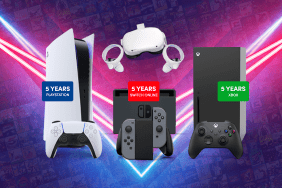I recently wrote an article titled Why The Last of Us Remastered Shouldn’t Really Exist. While I had guessed that this feature would be somewhat divisive, I wasn’t really prepared for the sheer amount of vitriol that it would inspire, with comments ranging from me being branded as a “failure masquerading as a journalist,” to people lambasting me on my personal Twitter account and, somehow, via email. I had obviously raised the ire of many with what I believed to be a reasonably objective look at the game, and the (relatively one-sided) debate that was launched from it stood to offer me a wider knowledge of the gaming community’s thoughts on the current “remaster trend.”
Related: Why The Last of Us Remastered Shouldn’t Really Exist
If you haven’t read my previous piece then I suggest you do so before reading this one, but I’ll give a brief rundown for those of you who do not have the time/willpower to read through two features in one sitting. In the post, I essentially argued that while I loved The Last of Us, a remastered edition of a game barely a year old being Sony’s largest exclusive in 2014 was “ridiculous.” I was under the impression that was a rather innocuous statement, but when everyone from the easily-angered, full-time Internet commenters to celebrated games journalists began forming arguments against my point, I was swiftly made aware that I was very much in the minority on this one. So now I, with the added knowledge of the collected thoughts of the Internet hivemind, will take a look at the remaster trend on a broader scale, in the form of responses to the comments that I received.
“What’s your problem with remasters? A lot of people didn’t get to play these games the first time round. To say they shouldn’t exist is selfish.”

When HD remakes of games first started gaining popularity, their existence could be somewhat overlooked. While I rarely personally indulged in purchasing these titles, save for Silent Hill HD Collection (which looked positively dreadful, by the way), there was enough of a market for these budget-priced, high-def re-releases that they were deemed a cost-effective way for developers and publishers to gain a bit of extra cash on the side whilst putting in considerably less work than it takes to create a brand new title. However, considering that these HD remakes became a “thing” towards the tail-end of both the Xbox 360 and PS3’s respective life cycles, there wasn’t a lot of attention paid to them. Those consoles had their glory days, had earned their place atop the list of the greatest consoles ever made and therefore a sudden influx of retro remakes weren’t going to lead to claims of Sony and Microsoft shamelessly resorting to their former glories in a drought of new software releases.
This remastered trend, though, has carried over to the PS4 and Xbox One, two consoles which have barely passed the starting line before they’ve resorted to wheeling out games from the past. I understand that many of those who have plumped down the cash for the PS4 may have owned an Xbox 360 instead of a PS3 and therefore never had the chance to play The Last of Us, and I completely understand the reasoning behind those people purchasing The Last of Us Remastered. It’s a great game, and of course there will be many who want to experience it. In my previous feature, I even said that it was “difficult not to recommend it” – but that doesn’t prevent my disappointment in that the only major PS4 exclusive outside of Drive Club that I’ll get to play this year is a game that I already completed last year.
The Last of Us Remastered is just the tip of the iceberg as far as remasters go. We’ve already had a re-release of Tomb Raider, and in the next two years we’ll see Grand Theft Auto V, Metro Redux, Resident Evil, Sleeping Dogs, Halo’s 1, 2, 3 & 4 and The Walking Dead: Season One all receive a spot of polish before being pushed to store shelves and the PlayStation Store/Xbox Live Marketplace. Personally, I’ve yet to be blown away by anything yet released on the PS4/Xbox One, so for The Last of Us to receive such a high billing on the PS4’s 2014 line-up and for Halo: The Master Chief Collection to be considered the “highlight” of Microsoft’s E3 2014 showing (it even closed out their presentation) is a little infuriating.
Yes, I love most of the games that are receiving re-releases, but for this current console generation to suddenly find itself wading in a mire of old software like the video game equivalent of a band embarking upon a greatest hits tour, when there’s not much around the corner to be truly excited for outside of games that are also making their way to the PS3/Xbox 360 such as Destiny, is a little disheartening as an early adopter of both the PS4 and Xbox One. The gaming industry has often been lambasted for its over-reliance on sequels rather than the creation of new IP, with major developers sharing the prevailing belief that it’s less risky to churn out new iterations in existing series than it is to concoct original ideas. However, now we’re seeing this thought process being applied to re-releases – why risk shoveling money into new software this early in the PS4/Xbox One’s respective life cycles when people will happily buy the same old game over and over again, if you tell them that it now runs at 1080p and 60fps?
“The film industry frequently re-releases old movies on blu-ray, so why shouldn’t the gaming industry do it?”

Good point, but consider this: movies are a visual medium. A blu-ray player increases the visual fidelity of older movies, and that is all it’s expected to do in that regard. Video games are so much more than just fancy graphics, no matter how much this fruitless 720/1080p debate rages on. While we all enjoy something nice to look at, we expect much more from the games we play than attractive aesthetics alone – we want great experiences. To suggest that a “definitive edition” of a game need only see its resolution kicked up a notch is to reduce that game to nothing more than a pretty face.
The popularity and success of video games is defined by how the player interacts with the gameplay environment they provide, not how detailed the textures are or how realistic the lighting looks. Call of Duty has been running on the same old engine for years now, and Minecraft looks like a game created over a decade ago, yet those are two of the most prolific games in recent history. Graphics matter, but not as much as we’re led to believe that they do.
Also, films and TV series being reissued don’t actively get in the way of other films and shows being made. You won’t find yourself waiting longer for a season of Game of Thrones because HBO is busy preparing The Sopranos for a blu-ray release, but you will find a development team putting other projects on hold in order to bump up the polygon count on one of their old games. Yes, it’s a way for these developers we like to get an extra bit of cash, but we’re the consumer and it’s our role to say what we like and dislike about the things that the creators produce – it is my belief that we should be clamouring for new experiences, not retreads of old games, even if it’s nice to think that the fine folk over at Naughty Dog are getting a bit of extra cash in their pockets this year.
“If you don’t like it, then don’t buy it.”

Ah, the age-old derisive comment. If you don’t like something, don’t invest in it – that sounds simple enough, surely? While this opinion essentially invalidates gaming journalism as a whole (“if you don’t like a video game, why review it?”) it’s the one that I was hit with the most. In fact, if you’re to glance upon any negative article about a video game published on the Internet, chances are you’ll see this comment, or something incredibly similar to it, posted beneath it. Unfortunately for these sorts of commenters, it’s our job as gaming journalists to point at things happening in the industry and either say “Wow, that looks good!” or “Hmm, I’m not too happy about that happening.” It’s our job to pay closer attention to the industry more than the average Joe/Jill, and then take the knowledge we have gleaned and present it to the consumer in order for them to form their own opinion. While “if you don’t like it, don’t buy it” is certainly an opinion, it’s not necessarily a helpful one.
As previously mentioned, the plethora of “Game of the Year Editions” and HD remakes that were released in the last console generation didn’t get too many peoples’ backs up, because there was already a wide array of software to choose from. We were essentially spoilt with great releases from pillar to post, and though this may very well be the case with the PS4 and Xbox One in a few years time, it’s not the case yet. In my humble opinion, there’s not enough great software lined up for either console in the near future to warrant such a large amount of re-releases, and while I would welcome The Last of Us Remastered, Sleeping Dogs Definitive Edition and Resident Evil Remastered Again when my PS4 isn’t used solely to play games I could buy for my Xbox 360 and PS3/when my Xbox One wasn’t gathering literal dust on my shelf, it’s not what I’m looking for as an early adopter of a console, and I’m sure that if this trend continues at its current rate, a lot of people will soon be echoing my opinion.








